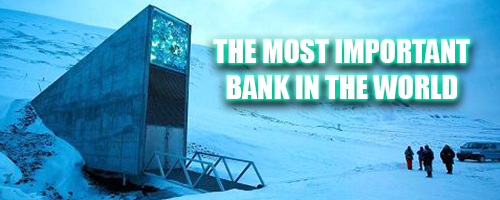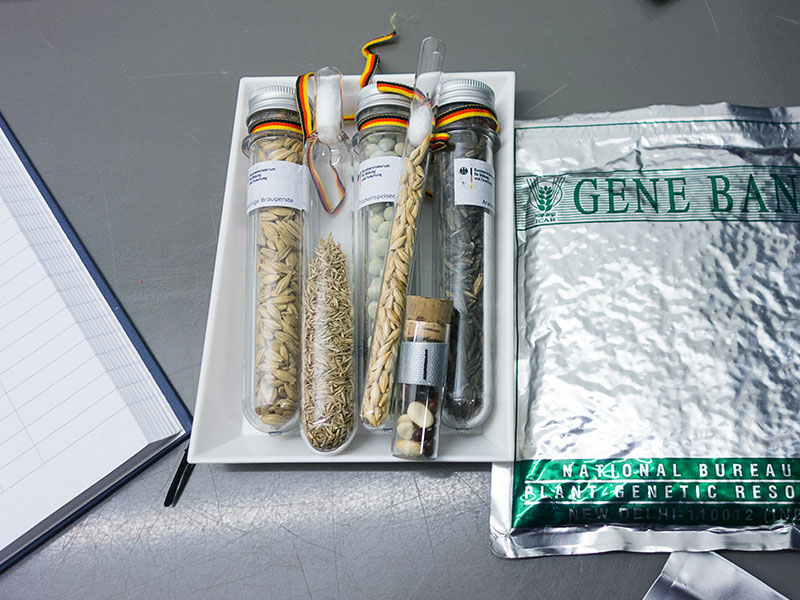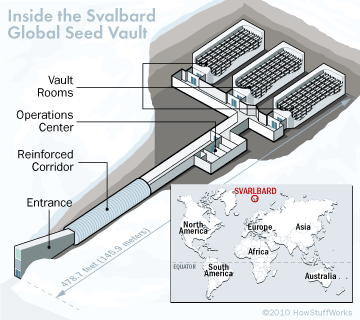
by James Corbett
corbettreport.com
February 28, 2017
corbettreport.com
February 28, 2017
The most important bank in the world received a huge deposit of 50,000 last week. Not 50,000 dollars; 50,000 seed samples.
The most important bank in the world is, of course, the Svalbard Global Seed Vault,
a repository of the planet’s genetic legacy dug into the permafrost in
the side of a sandstone mountain on Svalbard, a Norwegian archipelago
halfway between mainland Norway and the North Pole.
The seed vault’s administrator, The Crop Trust,
describes the vault as “a fail-safe seed storage facility, built to
stand the test of time—and the challenge of natural or man-made
disasters,” and boasts that it “represents the world’s largest
collection of crop diversity.”
Informally known as the “Doomsday Seed Vault”
the idea is that the permafrost of a remote North Atlantic archipelago
is a safe place to store copies of the most important seed varieties on
the planet, including some of the world’s most important staple crops
like potato, rice, wheat, lentil and chickpea.
The latest deposit
of 50,000 seed samples come from Benin, India, Pakistan, Lebanon,
Morocco, the Netherlands, the U.S, Mexico, Bosnia and Herzegovina,
Belarus and the U.K. and include 15,000 samples that were withdrawn from
the bank in 2015 and returned by researchers who had lost access to
their own gene bank in Syria during the ongoing terrorist insurgency.
But here’s the real question that you don’t see addressed in any of the fake news coverage
of this recent deposit in the establishment press: What “natural or
man-made disasters” does The Crop Trust envision wiping out the genetic
heritage of the earth, exactly, and who is “The Crop Trust” anyway?
Well, the second part of that question is easy enough to answer.
As researcher William Engdahl noted in his article on the vault a decade ago:
The first notable point is who is sponsoring the doomsday seed vault. Here joining the Norwegians are, as noted, the Bill & Melinda Gates Foundation; the US agribusiness giant DuPont/Pioneer Hi-Bred, one of the world’s largest owners of patented genetically-modified (GMO) plant seeds and related agrichemicals; Syngenta, the Swiss-based major GMO seed and agrichemicals company through its Syngenta Foundation; the Rockefeller Foundation, the private group who created the “gene revolution” with over $100 million of seed money since the 1970s; CGIAR, the global network created by the Rockefeller Foundation to promote its ideal of genetic purity through agriculture change.

And as I wrote in these pages in 2015:
So who is the “Global Crop Diversity Trust” which oversees the project? Describing itself as an “established independent organization under international law,” the Trust “was founded in 2004 in Rome, Italy, by the Food and Agriculture Organization and Bioversity International on behalf of the CGIAR international agricultural research consortium. The Crop Trust concluded a Headquarters Agreement with the Government of the Federal Republic of Germany in December 2012 and transferred its headquarters to its permanent location in Bonn in 2013.” The GCDT was chaired until 2012 by Margaret Catley-Carlson, a former President of (you guessed it) the J.D. Rockefeller III-founded Population Council (aka American Eugenics Society). No matter where you turn in this field, you always end up back at the doorstep of the same elite eugenics-obsessed families and the corporate oligopoly they helped to bring into existence.
Surprise, surprise. And given that it is the very same eugenics-obsessed families and foundations behind the GMO revolution
that are behind this seed vault, do we really have to puzzle over why
they are so concerned about the possibility of an ecological disaster
that could wipe out all of the heirloom, non-GMO seed strains on the
planet? The question, framed properly, answers itself.
So the good news is that another 50,000
seed samples will be left for whoever survives the coming biological
disaster. The bad news is that the real founders and funders of the
Svalbard Global Seed Vault probably aren’t going to be saving any life
rafts for you.

No comments:
Post a Comment